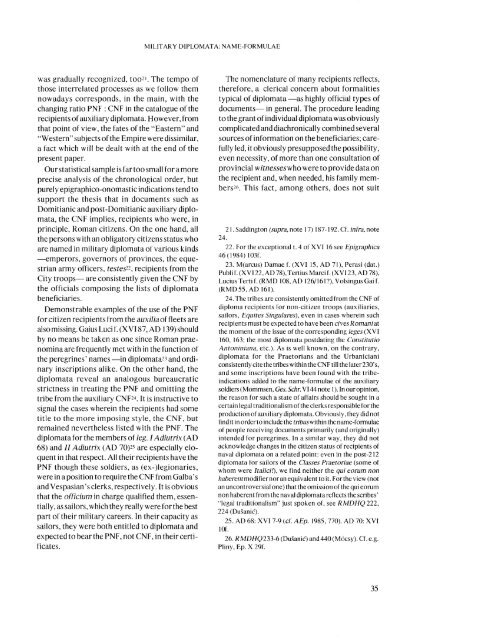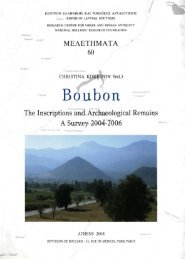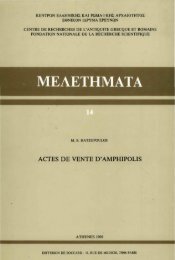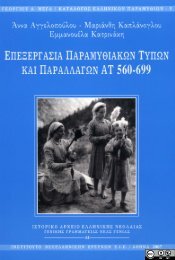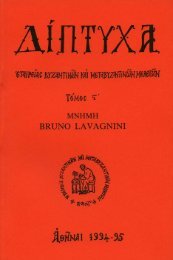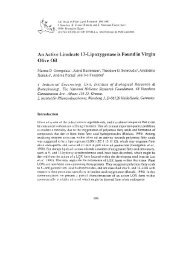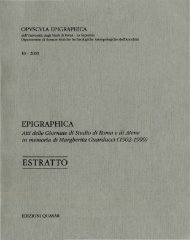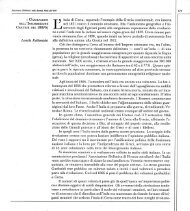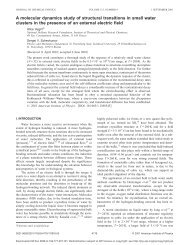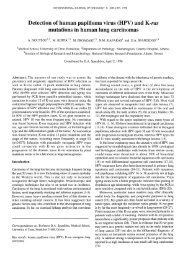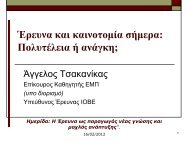Roman onomastics in the Greek East: social and political aspects ...
Roman onomastics in the Greek East: social and political aspects ...
Roman onomastics in the Greek East: social and political aspects ...
You also want an ePaper? Increase the reach of your titles
YUMPU automatically turns print PDFs into web optimized ePapers that Google loves.
was gradually recognized, too 21 . The tempo of<br />
those <strong>in</strong>terrelated processes as we follow <strong>the</strong>m<br />
nowadays corresponds, <strong>in</strong> <strong>the</strong> ma<strong>in</strong>, with <strong>the</strong><br />
chang<strong>in</strong>g ratio PNF : CNF <strong>in</strong> <strong>the</strong> catalogue of <strong>the</strong><br />
recipients of auxiliary diplomata. However, from<br />
that po<strong>in</strong>t of view, <strong>the</strong> fates of <strong>the</strong> "<strong>East</strong>ern" <strong>and</strong><br />
"Western" subjects of <strong>the</strong> Empire were dissimilar,<br />
a fact which will be dealt with at <strong>the</strong> end of <strong>the</strong><br />
present paper.<br />
Our statistical sample is far too small for a more<br />
precise analysis of <strong>the</strong> chronological order, but<br />
purely epigraphico-onomastic <strong>in</strong>dications tend to<br />
support <strong>the</strong> <strong>the</strong>sis that <strong>in</strong> documents such as<br />
Domitianic <strong>and</strong> post-Domitianic auxiliary diplomata,<br />
<strong>the</strong> CNF implies, recipients who were, <strong>in</strong><br />
pr<strong>in</strong>ciple, <strong>Roman</strong> citizens. On <strong>the</strong> one h<strong>and</strong>, all<br />
<strong>the</strong> persons with an obligatory citizens status who<br />
are named <strong>in</strong> military diplomata of various k<strong>in</strong>ds<br />
—emperors, governors of prov<strong>in</strong>ces, <strong>the</strong> equestrian<br />
army officers, testes 22 , recipients from <strong>the</strong><br />
City troops— are consistently given <strong>the</strong> CNF by<br />
<strong>the</strong> officials compos<strong>in</strong>g <strong>the</strong> lists of diplomata<br />
beneficiaries.<br />
Demonstrable examples of <strong>the</strong> use of <strong>the</strong> PNF<br />
for citizen recipients from <strong>the</strong> auxilia of fleets are<br />
also miss<strong>in</strong>g. Gaius Luci f. (XVI87, AD 139) should<br />
by no means be taken as one s<strong>in</strong>ce <strong>Roman</strong> praenom<strong>in</strong>a<br />
are frequently met with <strong>in</strong> <strong>the</strong> function of<br />
<strong>the</strong> peregr<strong>in</strong>es' names —<strong>in</strong> diplomata 23 <strong>and</strong> ord<strong>in</strong>ary<br />
<strong>in</strong>scriptions alike. On <strong>the</strong> o<strong>the</strong>r h<strong>and</strong>, <strong>the</strong><br />
diplomata reveal an analogous bureaucratic<br />
strictness <strong>in</strong> treat<strong>in</strong>g <strong>the</strong> PNF <strong>and</strong> omitt<strong>in</strong>g <strong>the</strong><br />
tribe from <strong>the</strong> auxiliary CNF 24 . It is <strong>in</strong>structive to<br />
signal <strong>the</strong> cases where<strong>in</strong> <strong>the</strong> recipients had some<br />
title to <strong>the</strong> more impos<strong>in</strong>g style, <strong>the</strong> CNF, but<br />
rema<strong>in</strong>ed never<strong>the</strong>less listed with <strong>the</strong> PNF. The<br />
diplomata for <strong>the</strong> members of leg. IAdiutrix (AD<br />
68) <strong>and</strong> II Adiutrix (AD 70) 25 are especially eloquent<br />
<strong>in</strong> that respect. All <strong>the</strong>ir recipients have <strong>the</strong><br />
PNF though <strong>the</strong>se soldiers, as (ex-)legionaries,<br />
were <strong>in</strong> a position to require <strong>the</strong> CNF from Galba's<br />
<strong>and</strong> Vespasian's clerks, respectively. It is obvious<br />
that <strong>the</strong> officium <strong>in</strong> charge qualified <strong>the</strong>m, essentially,<br />
as sailors, which <strong>the</strong>y really were for <strong>the</strong> best<br />
part of <strong>the</strong>ir military careers. In <strong>the</strong>ir capacity as<br />
sailors, <strong>the</strong>y were both entitled to diplomata <strong>and</strong><br />
expected to bear <strong>the</strong> PNF, not CNF, <strong>in</strong> <strong>the</strong>ir certificates.<br />
MILITARY DIPLOMATA: NAME-FORMULAE<br />
The nomenclature of many recipients reflects,<br />
<strong>the</strong>refore, a clerical concern about formalities<br />
typical of diplomata —as highly official types of<br />
documents— <strong>in</strong> general. The procedure lead<strong>in</strong>g<br />
to <strong>the</strong> grant of <strong>in</strong>di vidual diplomata was obviously<br />
complicated <strong>and</strong> diachronically comb<strong>in</strong>ed several<br />
sources of <strong>in</strong>formation on <strong>the</strong> beneficiaries; carefully<br />
led, it obviously presupposed <strong>the</strong> possibility,<br />
even necessity, of more than one consultation of<br />
prov<strong>in</strong>cial witnesses who were to provide data on<br />
<strong>the</strong> recipient <strong>and</strong>, when needed, his family members<br />
26 . This fact, among o<strong>the</strong>rs, does not suit<br />
21. Sadd<strong>in</strong>gton (supra, note 17) 187-192. Cf. <strong>in</strong>tra, note<br />
24.<br />
22. For <strong>the</strong> exceptional t. 4 of XVI 16 see Epigraphica<br />
46(1984) 103f.<br />
23. M(arcus) Damae f. (XVI 15, AD 71), Perasi (dat.)<br />
Publi f. (XVI22, AD 78),Tertius Marci f. (XVI23, AD 78),<br />
Lucius Terti f. (RMD 108, AD 126/161?), Vols<strong>in</strong>gus Gait.<br />
(RMD55,AD161).<br />
24. The tribes are consistently omitted from <strong>the</strong> CNF of<br />
diploma recipients for non-citizen troops (auxiliaries,<br />
sailors, Equités S<strong>in</strong>gulares), even <strong>in</strong> cases where<strong>in</strong> such<br />
recipients must be expected to have been cives <strong>Roman</strong>i at<br />
<strong>the</strong> moment of <strong>the</strong> issue of <strong>the</strong> correspond<strong>in</strong>g leges (XVI<br />
160, 163; <strong>the</strong> most diplomata postdat<strong>in</strong>g <strong>the</strong> Constitutio<br />
Anton<strong>in</strong>iana, etc.). As is well known, on <strong>the</strong> contrary,<br />
diplomata for <strong>the</strong> Praetorians <strong>and</strong> <strong>the</strong> Urbaniciani<br />
consistently cite <strong>the</strong> tribes with<strong>in</strong> <strong>the</strong> CNF till <strong>the</strong> later 230's,<br />
<strong>and</strong> some <strong>in</strong>scriptions have been found with <strong>the</strong> tribe<strong>in</strong>dications<br />
added to <strong>the</strong> name-formulae of <strong>the</strong> auxiliary<br />
soldiers (Mommsen, Ges. Sehr. VI 44 note 1 ). In our op<strong>in</strong>ion,<br />
<strong>the</strong> reason for such a state of affairs should be sought <strong>in</strong> a<br />
certa<strong>in</strong> legal traditionalism of <strong>the</strong> clerks responsible for <strong>the</strong><br />
production of auxiliary diplomata. Obviously, <strong>the</strong>y did not<br />
f<strong>in</strong>dit <strong>in</strong> orderto <strong>in</strong>clude <strong>the</strong> rribuswith<strong>in</strong> <strong>the</strong> name-formulae<br />
of people receiv<strong>in</strong>g documents primarily (<strong>and</strong> orig<strong>in</strong>ally)<br />
<strong>in</strong>tended for peregr<strong>in</strong>es. In a similar way, <strong>the</strong>y did not<br />
acknowledge changes <strong>in</strong> <strong>the</strong> citizen status of recipients of<br />
naval diplomata on a related po<strong>in</strong>t: even <strong>in</strong> <strong>the</strong> post-212<br />
diplomata for sailors of <strong>the</strong> Classes Praetoriae (some of<br />
whom were Italici!), we f<strong>in</strong>d nei<strong>the</strong>r <strong>the</strong> qui eorum non<br />
ftaberenrmodifier nor an equivalent to it. For<strong>the</strong> view (not<br />
an uncontroversial one) that <strong>the</strong> omission of <strong>the</strong> qui eorum<br />
non haberent from <strong>the</strong> naval diplomata reflects <strong>the</strong> scribes'<br />
"legal traditionalism" just spoken of, see RMDHQ222,<br />
TIA (Dusanic).<br />
25. AD 68: XVI 7-9 (cf. AEp. 1985, 770). AD 70: XVI<br />
lOf.<br />
26. RMDHQ233-6 (Dusanic) <strong>and</strong> 440 (Mócsy). Cf. e.g.<br />
Pl<strong>in</strong>y, Ep. X 29f.<br />
35


